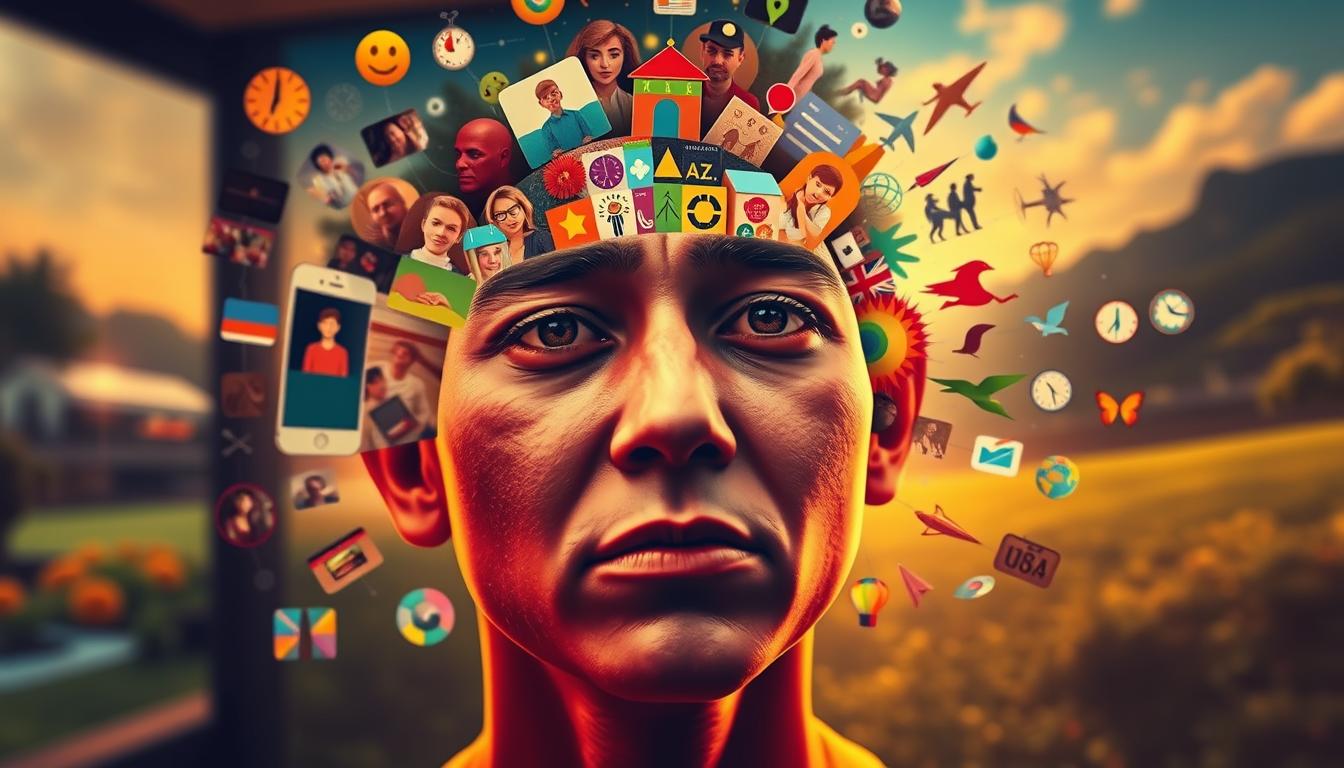I am a participant in the Amazon Services LLC Associates Program, an affiliate advertising program designed to provide a means for sites to earn advertising fees by advertising and linking to Amazon.com and affiliated sites. This post contains affiliate links. Privacy Policy
Understand the Causes of Your Mental Health
Knowing what affects your mental health is key to feeling better. Many people feel anxious or sad without knowing why. This is because many things, like biology, psychology, and environment, play a part.

By finding out what causes mental health problems, you can start to feel better. It’s important to know what affects your mental well-being. This way, you can understand how these things change your life.
Best brain supplement
Key Takeaways
- Biological factors can significantly impact your mental health.
- Psychological elements, such as thought patterns, play a crucial role.
- Environmental factors, including lifestyle and surroundings, contribute to mental health.
- Understanding these factors is key to improving mental well-being.
- Recognizing the causes of mental health issues empowers you to take control.
What Causes Mental Health Issues: An Overview
Many people face mental health challenges, and there are several reasons why. Mental health is complex, and knowing what causes issues is key to managing them.
Defining Mental Health and Mental Illness
Mental health covers your emotional, psychological, and social well-being. Mental illness, like depression and anxiety, are specific conditions that affect your mental health. It’s important to understand the difference between these terms to tackle mental health problems effectively.
The World Health Organization says mental health is about feeling good, handling life’s stresses, and being productive. This shows how vital mental health is for our overall well-being.
The Complex Interplay of Factors
Many factors contribute to mental health issues. Genetics, environment, and psychology all play a role. For example, genetic predisposition can increase the risk of mental health conditions. Environmental factors like trauma and stress can also trigger issues in some people.
Key factors include:
- Genetic predisposition
- Environmental factors such as trauma and stress
- Psychological factors, including personality traits and coping mechanisms
- Social determinants, such as socioeconomic status and access to resources
Prevalence of Mental Health Conditions in the United States
Mental health conditions are common in the United States, affecting millions yearly. The National Institute of Mental Health reports that nearly one in five adults in the U.S. experiences mental illness each year. Knowing how widespread these conditions are is crucial for tackling them.
This widespread issue calls for more awareness, education, and support. By understanding the causes and risk factors, you can work on keeping your mental health strong.
Biological and Genetic Factors
It’s key to know how biology and genes affect mental health. Your genes and body processes can really shape your mood and mind.
Genetic Predisposition to Mental Health Disorders
Genes play a big part in mental health issues. If your family has a history of mental health problems, you might face similar challenges. Studies have found certain genes can raise your risk of mental health issues.
Key factors to consider:
- Family history of mental health conditions
- Genetic markers associated with mental health disorders
- Inherited traits that may influence mental health
Brain Chemistry and Neurotransmitters
Brain chemistry and neurotransmitters are key to good mental health. Imbalances in serotonin and dopamine can cause depression and anxiety. Knowing how brain chemistry impacts your mind can guide your treatment choices.
Neurotransmitters help control mood, hunger, and sleep. When they’re out of balance, it can really affect your mental state.
Physical Health Conditions and Mental Well-being
Physical health issues can deeply impact your mental health. Chronic illnesses, pain, and other health problems can lead to mental health issues. For example, people with chronic pain might feel depressed or anxious.
Some physical health conditions that can affect mental health include:
- Chronic pain
- Diabetes
- Heart disease
- Obesity
Understanding how physical health and mental well-being are connected can help you manage your mental health better.
Psychological Contributors to Mental Health Problems
It’s important to know how psychological factors affect your mental health. Your well-being can be shaped by past experiences, personality, and how you think.
Trauma and Adverse Life Experiences
Experiencing trauma or hard times can deeply affect your mental health. Conditions like post-traumatic stress disorder (PTSD) can develop after traumatic events. It’s key to look for signs and get help when needed.
Common effects of trauma include:
- Flashbacks and nightmares
- Avoidance of triggers that remind you of the trauma
- Hypervigilance and exaggerated startle response
Personality Traits and Coping Mechanisms
Your personality and how you cope with stress are crucial. Some traits might make you more vulnerable, while others help you deal with stress better.
Effective coping mechanisms might include:
- Seeking social support from friends, family, or support groups
- Engaging in physical activity or exercise
- Practicing mindfulness or meditation
Cognitive Patterns and Thought Processes
Negative thinking patterns can lead to mental health issues like depression and anxiety. Recognizing these patterns is the first step to changing them.
Some common negative thought patterns include:
- Catastrophizing: expecting the worst-case scenario
- Overgeneralizing: assuming that one experience will apply to all similar situations
- Mind reading: believing you know what others are thinking without evidence
By understanding and addressing these psychological factors, you can work on keeping your mental health strong.
Environmental and Social Determinants
Understanding how your environment and society affect your mental health is key. Your surroundings and the society you live in can either help or harm your mental well-being.
Family Dynamics and Early Relationships
Your family and early relationships shape your mental health. A supportive family can help you stay mentally strong. But, a dysfunctional family can lead to mental health problems.
Nurturing early relationships are vital. Positive interactions with caregivers help develop healthy attachment styles. This is linked to better mental health. On the other hand, neglect or abuse can have lasting negative effects.
Socioeconomic Factors and Access to Resources
Socioeconomic factors, like your economic status and access to resources, greatly affect your mental health. People from lower socioeconomic backgrounds often struggle to get mental health care. This makes their mental health issues worse.
- Limited access to healthcare services
- Financial stress and insecurity
- Lack of social support networks
Economic instability can cause more stress, anxiety, and depression. It’s crucial to tackle these socioeconomic issues to better mental health.
Cultural and Societal Pressures
Cultural and societal expectations can also affect your mental health. Different cultures have different norms and expectations. These can impact an individual’s mental well-being.
Workplace and Educational Stressors
The workplace and educational environments are major stressors for many. The pressure to perform, meet deadlines, and achieve success can lead to stress, anxiety, and burnout.
| Stressor | Workplace | Educational |
|---|---|---|
| Performance Pressure | Meeting deadlines and targets | Achieving high grades |
| Social Interactions | Colleague relationships | Peer relationships |
| Workload | Excessive workload | Heavy coursework |
Recognizing these stressors is the first step to reducing their impact on your mental health. Strategies like stress management, seeking support, and maintaining a healthy work-life balance can help.
Conclusion: Taking Control of Your Mental Health Journey
Understanding what affects your mental health is key. Recognizing the role of biology, psychology, and environment helps you make better choices. This knowledge is the first step to improving your mental well-being.
Improving your mental health might mean getting professional help or changing your lifestyle. Your daily habits have a big impact on your mental state. Also, knowing how society affects your mental health can help you deal with pressures.
Improving your mental health is a journey that takes time and patience. Start with small changes and stay consistent. Your mental health journey is personal, and being informed and proactive is the first step to a balanced life.
FAQ
What are the main causes of mental health issues?
Mental health problems come from many sources. These include genetics, brain chemistry, and life experiences. Also, things like money, culture, and work can play a part.
How do genetic factors contribute to mental health disorders?
Genetics can make you more likely to get certain mental health issues. This is true for things like depression and anxiety, especially if your family has them too.
What role do brain chemistry and neurotransmitters play in mental health?
Brain chemistry, especially with neurotransmitters like serotonin and dopamine, is key. Imbalances can lead to depression and anxiety. This shows how important brain chemistry is for our mental health.
How do physical health conditions impact mental well-being?
Chronic illnesses and pain can lead to mental health problems. This includes depression and anxiety. They affect our overall well-being and mental health.
Can trauma and adverse life experiences affect mental health?
Yes, trauma and tough life experiences can deeply affect mental health. They can lead to conditions like PTSD.
How do socioeconomic factors influence mental health?
Socioeconomic factors, like access to resources, greatly impact mental health. People from lower backgrounds often face more challenges in getting help.
What is the impact of cultural and societal pressures on mental health?
Cultural and societal pressures can also affect mental health. They can add stress and expectations, leading to issues like anxiety and depression.
How do workplace and educational stressors affect mental health?
Work and school stress are big environmental factors. They can cause stress, anxiety, and burnout. This is because they put a lot of pressure on people.
Can lifestyle choices impact mental health?
Yes, lifestyle choices can greatly affect mental health. Healthy choices can help, while unhealthy ones can make problems worse. This shows how important lifestyle is for our mental well-being.
How can understanding the causes of mental health issues help in managing them?
Knowing what causes mental health issues is key to managing them. It helps you make better choices for your mental health. This improves your overall quality of life.
I am a participant in the Amazon Services LLC Associates Program, an affiliate advertising program designed to provide a means for sites to earn advertising fees by advertising and linking to Amazon.com and affiliated sites. This post contains affiliate links. Privacy Policy


